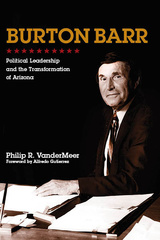Barry Goldwater and the Remaking of the American Political Landscape
Edited by Elizabeth Tandy Shermer
The University of Arizona Press
Nearly four million Americans worked on Barry Goldwater’s behalf in the presidential election of 1964. These citizens were as dedicated to their cause as those who fought for civil rights and against the Vietnam War. Arguably, the conservative agenda that began with Goldwater has had effects on American politics and society as profound and far reaching as the liberalism of the 1960s. According to the essays in this volume, it’s high time for a reconsideration of Barry Goldwater’s legacy.
Since Goldwater’s death in 1998, politicians, pundits, and academics have been assessing his achievements and his shortcomings. The twelve essays in this volume thoroughly examine the life, times, and impact of “Mr. Conservative.” Scrutinizing the transformation of a Phoenix department store owner into a politician, de facto political philosopher, and five-time US senator, contributors highlight the importance of power, showcasing the relationship between the nascent conservative movement’s cadre of elite businessmen, newsmen, and intellectuals and their followers at the grassroots—or sagebrush—level.
Goldwater, who was born in the Arizona Territory in 1909, was deeply influenced by his Western upbringing. With his appearance on the national stage in 1964, he not only articulated a new brand of conservatism but gave a voice to many Americans who were not enamored with the social and political changes of the era. He may have lost the battle for the presidency, but he energized a coalition of journalists, publishers, women’s groups, and Southerners to band together in a movement that reshaped the nation.
Since Goldwater’s death in 1998, politicians, pundits, and academics have been assessing his achievements and his shortcomings. The twelve essays in this volume thoroughly examine the life, times, and impact of “Mr. Conservative.” Scrutinizing the transformation of a Phoenix department store owner into a politician, de facto political philosopher, and five-time US senator, contributors highlight the importance of power, showcasing the relationship between the nascent conservative movement’s cadre of elite businessmen, newsmen, and intellectuals and their followers at the grassroots—or sagebrush—level.
Goldwater, who was born in the Arizona Territory in 1909, was deeply influenced by his Western upbringing. With his appearance on the national stage in 1964, he not only articulated a new brand of conservatism but gave a voice to many Americans who were not enamored with the social and political changes of the era. He may have lost the battle for the presidency, but he energized a coalition of journalists, publishers, women’s groups, and Southerners to band together in a movement that reshaped the nation.
'This book offers valuable scholarship that further cements Goldwater's central place in the rise of American conservatism.'—CHOICE Reviews
'The insightful pieces in this book offer a vision of the historical specificity of midcentury postwar conservatism.'—The Journal of American History
‘The essays making up the chapters are interesting, well researched, and thought-provoking.’—Mary Brennan, author of Wives, Mothers, and the Red Menace: Conservative Women and the Crusade Against Communism
'A fine survey of Goldwater's impact on American politics and society.'—California Bookwatch, The Political Science Shelf
‘This anthology is important on a national level because it serves to describe how Goldwater played a vital role in the rise of the conservative movement in post-WWII America. . . . Political junkies in Arizona and elsewhere will consider this required reading.’—Journal of Arizona History
‘Shermer reframes important controversies such as the relationship between southern and western conservatism, between religious and business conservatism, and between elite and grassroots mobilizations on the right.’—Bruce J. Schulman, author of The Seventies: The Great Shift in American Culture, Society, and Politics
Elizabeth Tandy Shermer is an assistant professor of history at Loyola University Chicago. She is the author of Sunbelt Capitalism: Phoenix and the Transformation of American Politics, co-editor of The Right and Labor in America: Politics, Ideology, and Imagination, and a regular contributor to Bloomberg View’s economic history blog, Echoes.











